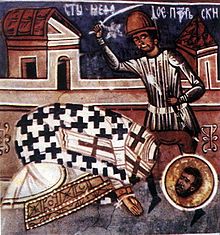St. Methodius of Olympus
Death: 311

Bishop and martyr, famous for his writings. St. Jerome wrote of his martyrdom at Chalcis, in modern Greece. Methodius was the bishop of Olympus, Lycia, in Asia Minor. He then ruled Tyre, Lebanon, or possibly Patara, in Lycia, and was the author of the treatise On the Resurrection and the Symposium .


Saint Methodius of Olympus(died c. 311) was a Christian bishop, ecclesiastical author and martyr today regarded as a Church Father. He is commemorated on June 20.[2]
Life
Few reports have survived on the life of this first systematic opponent of Origen; even these short accounts present many difficulties. Eusebius does not mention him in his Church History, probably because he opposed various theories of Origen. We are indebted to Saint Jeromefor the earliest accounts of him.[3]According to him, Methodius was Bishop of Olympos in Lycia and afterwards Bishop of Tyre. No later Greek author knows anything of his being Bishop of Tyre; and according to Eusebius,[4]Tyrannio was Bishop of Tyre during the persecutions of Diocletian and died a martyr; after the persecution Paulinus was elected bishop of the city. Later sources make him bishop not of Olympos but of Patara, also in Lycia. It has been conjecture that he could have held both sees simultaneously, but this is unlikely.[5]
Jerome further states that Methodius suffered martyrdom at the end of the last persecution, i.e., under Maximinus Daia(311). Although he then adds, "that some assert", that this may have happened under Decius and Valerian at Chalcis, this statement (ut alii affirmant), adduced even by him as uncertain, is unlikely. Various attempts have been made to clear up the error concerning the mention of Tyre as a subsequent bishopric of Methodius; it is possible that he was transported to Tyre during the persecution and died there.
Works
Methodius had a comprehensive philosophical education, and was an important theologian as well as a prolific and polished author. Chronologically, his works can only be assigned in a general way to the end of the third and the beginning of the 4th century. He became of special importance in the history of theological literature, in that he combated various views of the great Alexandrian, Origen. He particularly attacked his doctrine that man's body at the resurrection is not the same body as he had in life, as well as his idea of the world's eternity. Nevertheless, he recognized the great services of Origen in ecclesiastical theology.[6]
Like Origen, he is strongly influenced by Plato's philosophy, and uses to a great extent the allegorical explanation of Scripture. Of his numerous works only one has come down to us complete in a Greek text: the dialogue on virginity, under the title Symposium, or on Virginity(Symposion e peri hagneias).[7] In the dialogue, composed with reference to Plato's Symposium, he depicts a festive meal of ten virgins in the garden of Arete, at which each of the participators extols Christian virginity and its sublime excellence. It concludes with a hymn on Jesus as the Bridegroom of the Church. Larger fragments are preserved of several other writings in Greek; we know of other works from old versions in Slavonic, though some are abbreviated.
The following works are in the form of dialogue:
- On Free Will (peri tou autexousiou), an important treatise attacking the Gnostic view of the origin of evil and in proof of the freedom of the human will
- On the Resurrection (Aglaophon e peri tes anastaseos), in which the doctrine that the same body that man has in life will be awakened to incorruptibility at the resurrection is specially put forward in opposition to Origen.
While large portions of the original Greek text of both these writings are preserved, we have only Slavonic versions of the four following shorter treatises:
- De vita, on life and rational action, which exhorts in particular to contentedness in this life and to the hope of the life to come
- De cibis, on the Jewish dietary laws, and on the young cow, which is mentioned in Leviticus, with allegorical explanation of the Old Testament food-legislation and the red cow (Num., xix)
- De lepra, on leprosy, to Sistelius, a dialogue between Eubulius (Methodius) and Sistelius on the mystic sense of the Old Testament references to lepers (Lev., xiii)
- De sanguisuga, on the leech in Proverbs (Prov., xxx, 15 sq.) and on the text, "the heavens show forth the glory of God" (Ps. xviii, 2).
Of other writings, no longer extant, Jerome mentions (loc. cit.) a voluminous work against Porphyry, the Neoplatonistwho had published a book against Christianity; a treatise on the Pythonissadirected against Origen, commentaries on Genesis and the Canticle of Canticles. Other authors attributed a work On the Martyrs, and a dialogue Xenon to Methodius; in the latter he opposes the doctrine of Origen on the eternity of the world. Gregory Abu'l Faraj attribute to Methodius some kind of work dealing with the patriarchs.[8]
The 7th-century Apocalypse of Pseudo-Methodius is falsely attributed to him. His feast day is September 18. Among the editions of his works are: P.G., XVIII; Jahn, S. Methodii opera et S. Methodius platonizans (Halle, 1865); Bonwetsch, Methodius von Olympus: I, Schriften(Leipzig, 1891).

கருத்துகள் இல்லை:
கருத்துரையிடுக